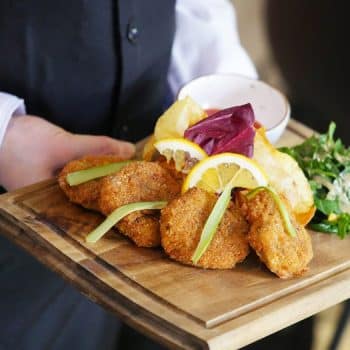
This post presents complete information on the job description of a catering server, to help you learn the duties, tasks, and responsibilities they commonly carry out.
What Does a Catering Server Do?
Catering servers are responsible for picking up, delivering, setting up, servicing, and breaking down of catering events.
The catering server role is similar to that of the waiter even though their titles may be different at different companies.
According to Onetonline, the waiter or catering server takes orders for food or drinks from the customer and follow up to ensure they are enjoying their meals.
The catering server job description entails ensuring that optimum guest satisfaction is achieved during events and other banquet services the company renders.
Their duties include bar tending, running food, carving stations, buffets, and restocking products and supplies following the standard of the event.
Other tasks they perform include pulling equipment from storage location, transporting them to event venue, and setting them up for use.
After use, they are to dismantle equipment and return them to storage.
By this, the catering server ensures that equipment are adequately provided for each event and also ensures the safety of the equipment.
They may also help out in ensuring the event environment is clean and safe utilizing their knowledge of state environmental policies and procedures.
The job of a catering server is physically demanding as it involves a lot of standing, walking, handling, lifting, and moving of items that are up to 50 pounds.
Though not much requirements are needed to work as a catering server in terms of training and certification, any individual looking to work in the position must be able to read and make simple writings like correspondence and response to memos.
He/she should also be able to answer to customers’ inquiries since their contact with guests or customers is high.
Catering Server Job Description Example/Sample/Template
The job description sample below shows a list of major duties, tasks, and responsibilities that usually make up the daily work activities of a catering server:
- Operate the catering truck.
- Perform operational duties such as organizing and completing events.
- Perform table setting, carry trays, and execute serving tasks following standard dinning etiquette.
- Follow standard production procedures when carrying out duties such as beverage service, plating, and salad preparation.
- Provide assistance in training and supervision of new employees and interns.
- Ensure food waste is minimized.
- Responsible for operating dishwasher, as well as organizing and maintaining dish storage and small wares.
Download job description template.
Catering Server Requirements: Skills, Abilities, and Knowledge for Career Success
To be effective on the job, the following requirements, including skills and knowledge are important for a catering server to have:
- Successful graduated from high school with a diploma.
- Knowledge of catering procedures, including storage, sanitation and safety.
- Ability to work with relevant catering equipment effectively and teach others to use it also.
- Event planning and execution skills, needed to plan and execute events smoothly.
- Ability to give attention to details to be able to create exciting ambiance for buffet.
- Knowledge of all table service techniques and ability to apply them.
- Upholds punctuality, personal hygiene, and cleanliness.
- Dependable with proven ability to work effectively with others in a team.
- Possess valid state driver’s license.
- Physically able, with the ability to bend, kneel, stoop, twist, squat, walk, and stand for long periods at a time, like 2 to 4 hours all through the day.
- Ability to regularly lift items weighing 50 pounds and more.
- Ability to smell, taste, feel, see, hear and speak.
Catering Server Employment
The employment figure for waiters and waitresses, including catering servers in the United States in 2023 was 2,237,850. This is according to the U.S. Bureau of Labor Statistics.
Restaurants and other eating places, traveler accommodation, and other amusement and recreation industries are some of the top industries for employment for waiters, including catering servers, with 1,830,190, 127,390, and 69,720 employments respectively.
Catering Server Salary
The average waiter salary, including catering server, was $17.56 per hour and $36,530 yearly according to 2023 report by the U.S. Bureau of Labor Statistics.
Vermont, Washington, and District of Columbia are some of the best paying states for waiters, including catering servers in the U.S. with yearly salary of $ 60,200, $ 57,960, and $ 51,970, respectively.
Also, industries that pay the highest salaries to waiters, including catering servers include promoters of performing arts, sports, and similar events ($55,640), other schools and instruction ($46,770), and independent artists, writers, and performers ($45,560).
Catering Server Career Opportunities
There are different career opportunities open to catering servers, these include:
- Kitchen Porter
A kitchen porter is a kitchen staff member who is responsible for all of the tasks in maintaining the kitchen and equipment.
The kitchen porter job duties include washing, drying, scrubbing, and sanitizing and storage.
Kitchen porters are typically responsible for everything from gathering ingredients to cooking food, to cleaning up after dining events.
2. Catering Assistant
A catering assistant is typically required to work in a caterer’s event kitchen on an hourly basis preparing food for an event or company meal.
Their primary responsibility is handling prep tasks such as cutting meats.
3. Catering Waiter
A catering waiter is responsible for providing professional services to guests and clients in a caterer’s event.
They will help with serving and cleaning up food, as well as providing beverages and snacks.
4. Catering Supervisor
A catering supervisor is the second-in-command caterer’s officer that works directly under a catering manager, who is ultimately in charge of the overall operation of a caterer.
Their function is to manage the staff and assist in the management of multiple events simultaneously.
5. Catering Manager
A catering manager is in charge of finalizing all food purchasing, preparation, and service for all events.
They are responsible for hiring and training staff that work directly under them.
6. Event Planner
An event planner is a person who works in conjunction with the catering department to ensure that there is enough food for every event.
Their job usually requires extensive planning and organizing, whether it be at the store or in the kitchen.
7. Food Marketing Specialist
A food marketing specialist follows up with customers after an event to see how they enjoyed their meal.
8. Restaurant Manager
A restaurant manager is a person who manages a restaurant or culinary establishment.
They often have a high school diploma and at least two years of experience in the foodservice or hospitality industry.
The annual salary range for this job is $36,456 to $60,531.
9. Food Marketing Specialist
A food marketing specialist works in the field of promoting food products within organizations or companies.
They must be able to initiate and develop promotional programs, as well as effectively market these products within these organizations and companies.
10. Wine, Bar and Restaurant Nutritionist (WBRN) Specialist
A wine, bar, and restaurant nutritionist (WBRN) specialist is a type of registered dietitian who is educated in subjects such as food service management and beverage alcohol production.
This job requires a high level of commitment to both the professional development as well as continuing education in various areas such as culinary arts, food science, and food marketing.
11. Restaurant Sales Representatives
A restaurant sales representative is a person who works in the field of selling products to restaurants.
The job requires a high level of commitment, determination, and work ethic.
Sales representatives are typically responsible for selling their products to clubs and catering companies.
They will often make cold calls on behalf of their company to various restaurants while also maintaining excellent customer relations skills.
Challenges faced by Catering Servers on the Job
The challenges faced by catering servers on the job include:
- Extra Responsibility
Catering is a demanding job, and servers have a lot of responsibilities in supporting the caterer to give a successful event.
Catering servers are expected to perform various duties that may be outside their core responsibilities.
2. Time Management
Catering servers usually have a busy work day, so they must be able to management time to match with what has been planned by the caterer.
3. Financial Issues
Being a catering server is not a lucrative job, and many people are forced to work 2-3 jobs in order to support themselves and their families.
This can be very stressful and difficult on servers as they have to work long hours at multiple locations, as well as deal with the mental pressure of wondering if they will ever have enough money to make ends meet.
Catering Server Job Satisfaction
Restaurant employees are not satisfied with their work, says a survey carried out by Murat Hancer and R. Thomas George of Adnan Menderes University, Turkey and Ohio State University respectively.
The survey, which utilized the Minnesota Satisfaction Questionnaire, discovered that 50.2% of responders, which were 798 restaurant workers, including catering servers were dissatisfied with their job.
How to Become a Catering Server
If you are interested in becoming a catering server, here are steps you can follow:
- Accumulate relevant work experience.
Support positions such as food runner, busser, or service assistant can help you gain relevant work experience to become a catering server.
Customer service skills can also be learned in fast-food restaurants, diners, and other casual dining or retail establishments.
2. Obtain technical credentials.
Though not usually required, safety certifications such as CPR, food safety, and alcohol service may be obtained to prepare you for the responsibilities of a catering server.
3. Create a resume.
On your resume, you should include your highest level of education, relevant certifications, and work history.
Your work experience should include the name of the company, the dates you worked there, and a summary of your responsibilities, learned skills, and accomplishments.
4. Apply for entry-level jobs.
Examine the current job market in your region. Apply for positions that you are qualified for based on your previous work experience and existing competencies.
If you demonstrate your qualifications, employers are more likely to invite you for an interview.
Present your resume along with a cover letter that summarizes your qualifications for that specific role and company.
Major Benefits of a Catering Server Career
In spite of the challenges faced by catering servers on their job, there are also some benefits of the job:
- More pay per hour.
Because servers are wait staff, they tend to earn more per hour than other positions.
This can also be credited to their excellent customer service skills which may result into higher tips.
Salaries as well as benefits vary according to the area of work and the company that you work for.
2. Employee benefits
At many companies, servers receive health insurance, paid vacation time, and paid holidays.
These benefits can help employees relax and focus on their work.
3. Flexibility
Schedule flexibility is very important for many servers because the nature of their job means that they may not be able to plan their schedules very well in advance.
Many servers try to pick shifts on weekends and evenings, but this depends on the type of restaurant they work for.
4. Traveling
One of the benefits of this job is that servers are able to travel around and explore new places.
However, the traveling depends on the type of catering company that you work for.
For example, if you work at a wedding venue, then you will not be able to go far from the location.
5. Opportunity to meet people
The nature of the catering server job also allows them to network with people and make connections in other industries.
6. Learn people skills
Due to the nature of the job, servers may need to interact with a wide array of people.
They learn people skills which aid them to serve their customers with good manners and respect, having taken the time to learn about their preferences.
7. Training
The learning process for servers is the same as many other jobs.
They must learn how to perform their duties and how to work under pressure and maintain good customer relations.
Job training and acquiring skills in this field can be learned through community college classes as well as online continuing education courses.
References:
U.S. Bureau of Labor Statistics
O*NET OnLine
Resources for Catering Servers
Here are helpful resources you can access to boost your knowledge of the hospitality industry and grow your career as a catering server:
Professional Organizations
| National Restaurant Association The National Restaurant Association is over 100 years old and is the world's largest foodservice trade association, proving representation and advocacy on behalf of the restaurant industry. | American Hotel & Lodging Association The American Hotel & Lodging Association is a leading voice and supporter of the American hospitality industry. | Food and Beverage Association of America The Food and Beverage Association of America encourages and promotes continuing education, career growth, and friendly relation among its members. It also provides scholarships in industry fields. |
Useful Blogs
| The Waiter's Academy The Waiter's Academy provides free training to industry professionals to improve on their knowledge, skills, and income. | OpenTable OpenTable's restaurant blog provides lots of valuable content for restaurant professionals. | Modern Restaurant Management This blog provides restaurant management news, expert advice, and industry trends. |
Valuable Books
| Food and Beverage Service: A Handbook for Hospitality and Tourism Services This book covers various techniquesin food and beverage service | Strategic Questions in Food and Beverage Management Discover various critical reviews of issues in food and beverage management | Food and Beverage Service This book is for individuals working towards professional qualifications in food and beverage service, as well as trainers and practitioners. |












